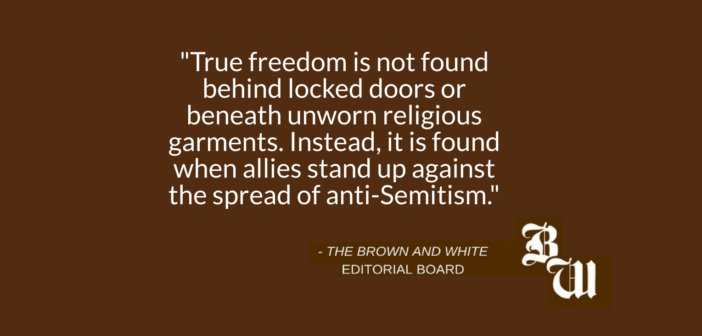In just a few days, we will remember the 11 Jewish lives lost at the hands of an anti-Semitic gunman in Pittsburgh a year ago. As we recognize the tragedy’s anniversary, it is critical that we work to uproot the anti-Semitic undertow that continues to threaten lives worldwide.
The Anti-Defamation League reported 1,879 anti-Semitic incidents in 2018 alone. Behind each reported attack, the Anti-Defamation League found an increase in “physical assaults, including the deadliest attack on Jews in US history.”
The nation met the deadly attack with sympathy and support for the Jewish community. And while the nation demanded change and mourned the tragedy, the reality of anti-Semitism extends beyond a single incident. The global presence of anti-Semitism is an urgent threat to the safety and freedom of the Jewish population.
And though a year has passed since the deadliest U.S. anti-Semitic attack, anti-Semitic agendas continue to gain traction worldwide.
On Oct. 9, members of the Jewish community gathered in Halle, Germany, in celebration of Yom Kippur. As worshippers practiced the day of atonement and repentance, a bomb exploded outside of the synagogue doors, leaving two dead. The perpetrator later admitted to anti-Semitic motives.
Almost a year following the Pittsburgh shooting, hate invaded another place of worship, igniting fear in what should be a haven of sacredness and freedom.
And as the Jewish community mourns the loss of the victims, it is the global bystanders’ responsibility to address the anti-Semitic climate.
Over the past few years, attacks on the Jewish community have increased by 20 percent in Germany. For those who experience the anti-Semitic climate, the Oct. 9 attack was not a complete shock. Instead, it is a pressing reminder of how rapidly hate gains traction.
The buildup of anti-Semitic exercises have suppressed the Jewish community’s freedom to practice religion.
Lingering threats to the Jewish community have forced congregations to prioritize safety over the core Jewish principle to welcome all. Attacks on the Jewish community have compromised its ability to safely welcome strangers, but even so, on Oct. 9, Halle’s synagogue welcomed 20 visitors to join in worship.
The congregation requested a police presence at the service, and the request was not met. And while the perpetrator was unable to enter the synagogue due to minor security, the fact that the synagogue chose between welcoming all and maintaining safety should not be normalized.
A year has passed since the Pittsburgh shooting, but anxiety and fear have only risen inside places of worship. Synagogues, such as Beth Israel in Chester Springs, Pennsylvania, are now under constant surveillance and some rabbis carry panic buttons on their belts in preparation for attack.
Following the Halle attacks, German Jews have been warned “not to wear traditional kippahs in all public settings following a rise in anti-Semitic attacks across the country.”
And while we live in a precautionary world, the Jewish community should not have to compromise its freedom due to rising threats. True freedom is not found behind locked doors or beneath unworn religious garments. Instead, it is found when allies stand up against the spread of anti-Semitism.
As tragedies and hate-crimes are filtered out of the news cycle, synagogue doors lock and members of the Jewish community live with a lingering fear.
Eighty-five percent of Germans view anti-Semitism as a rising threat and eight in 10 Americans believe the government must work to combat anti-Semitism. Even still, Jewish communities have been left to vulnerably defend their religious freedom.
A year ago, 11 lives were lost as a result of anti-Semitism. A year ago, the world reacted with sympathy and support for the Jewish community. But almost a year later, two more lives have been lost and thousands of doors have been locked.
Global communities can continue to react with sympathy, but there are repercussions when promises and words are empty. The fight against anti-Semitism must become a global priority. It is impermissible to accept locked doors and hidden religious identities as freedom.






Comment policy
Comments posted to The Brown and White website are reviewed by a moderator before being approved. Incendiary speech or harassing language, including comments targeted at individuals, may be deemed unacceptable and not published. Spam and other soliciting will also be declined.
The Brown and White also reserves the right to not publish entirely anonymous comments.